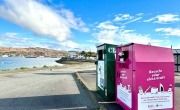Norfolk recycling centre still alight four days after catching fire
A fire that broke out at a Norfolk recycling plant on Saturday is continuing to burn, raising concerns over the air quality in the surrounding area.
The fire at the Glazewing Recycling Centre on Station Road in West Dereham, Norfolk, started around 6.15a.m. on 13 August, after material in the general waste area, which includes metal and plastic, caught fire.
The incident is thought to involve around 700 tonnes of waste material and around 13 different pumps from Norfolk, Suffolk and Cambridgeshire fire services responded to the incident. Firefighters then advised residents in the area to keep their windows closed.
This is not the first time the property owned by Glazewing, a waste management and recycling company, has caught fire. In 2003, the BBC reported that around 100 firefighters were needed to tackle a fire at the site with six pumps in attendance.
Yesterday, Lynn News reported that due to the fire the air quality in the area surrounding, the facility now needs to be monitored.
Fire contains domestic and trade waste
On 15 August, Fire Station Manager Tim Lewis spoke to the Eastern Daily Press, saying: “It’s a deep-seated fire, about six metres high, containing domestic and trade waste. We are letting the fire burn in a controlled manner, removing some of it to encourage it to burn quicker. We expect to be here for the next few days.”
An Environment Agency spokesperson added: “We helped put plans in place to safely remove contaminated fire water from the site, in tankers, and prevent the water running off into local watercourses. We will continue to work with the fire service and Glazewing to prevent environmental damage. The causes of the fire are not yet known.’
Series of fires at recycling centres
This is just the latest in a series of fires involving recycling plants.
On 9 August, a fire broke out at an Envirocon recycling plant in the West Midlands after recycled foam insulation overheated. The previous day, three fires erupted, two at recycling yards in Cornwall and Southampton and another at a paper processing plant in Greenwich.
Two weeks previously, 300 tonnes of waste caught fire at a Wandsworth recvcling facility, the second time within a week there had been a fire on site.
Statistics released by the Department of Environment, Food & Rural Affairs (Defra) in 2013 revealed that fires are a common occurrence at waste and recycling facilities. Between 2001 and 2012, a fire occurred such sites at an average rate of just under one per day with a total of 425 fires erupting in 2011 alone.
Guidance to prevent incidents
The Waste Industry Safety and Health (WISH) Forum released guidelines in 2014 to help reduce fires at waste and recycling sites by providing acceptable practices. The guidelines included measures that companies should follow to reduce the risk of fire, including:
· undertaking a fire risk assessment and liasing with the local fire department on a fire-fighting strategy;
· putting in place security measures such as CCTV, fences and alarms to reduce the likelihood of arson attacks;
· considering a formal close-down procedure, which could include shutting off all electrical supplies to machinery, to reduce the risk of fire out of hours; and
· undertaking regular fire drills to ensure staff know what actions need to be taken in the event of a fire.
Moreover, following an earlier series of high-profile fires at waste sites, and with the intention of reducing the possibility of such incidents in the future, the EA developed the guidance, which included new safety measures for the storage of all combustible materials, including several types of wood, in collaboration with the Department for Environment, Food & Rural Affairs (Defra).
However, after Hadfield Wood Recyclers, one of the largest wood treatment companies in the country, had to temporarily close down operations at two of its sites to avoid enforcement action based on the ‘completely unworkable’ guidance, the EA opened a consultation on the FPP guidance, setting out a number of new proposals.
Last month, the EA published the revised guidance on fire prevention plans, available on the GOV.UK website.
More information is available the WISH document on reducing fire risk, or in an exclusive comment for Resource from Mark Andrews, Waste Fires Lead, at the Chief Fire Officers Association.





